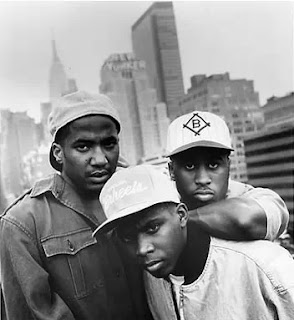Recorded in one session on December 4, 1964 with John Coltrane on saxophone, Jimmy Garrison on double bass, Elvin Jones on drums, and McCoy Tyner on piano, 'A Love Supreme' is essentially one long piece broken up into 4 parts. In liner notes and interviews, Coltrane said that this record is a very "spiritual album" about the struggle for purity and the recognizing of a higher power that gives him his talent and ability to play music. And while that is all well and good on paper, what is most impressive to me is that this is the message Coltrane actually conveys extremely well and powerfully through his music. 'A Love Supreme' is truly transportive album that takes the listener on a journey through its four suites; from excited awakening of Pt. 1: Acknowledgement to the peaceful and hymn-like finale of Pt. 4: Psalm. It is, without a doubt, one of the strongest and most moving pieces of jazz that I have ever had the pleasure to spend some time with; but it took me awhile to arrive at that opinion.
My first listen on Sunday was fairly disorienting (as I suppose it is for most jazz newbies). Jazz being jazz means that it doesn't follow conventional pop song structures; no verses or catchy chorus in sight. At first it's hard to pin down the trajectory of a song and I found I would automatically fall back into old habits and start to tune the record out, hearing it but not listening to it. Because I'm not a jazz listener, it was difficult for me to really appreciate everything that Coltrane and pals were doing on this record. So my first hurdle for the week was really just to do my best and actively pay attention to what I was hearing and begin to pick out moments and melodies that set this record apart. As I continued with repeated listens, 'A Love Supreme' went from being disorienting to truly engaging.
Though Coltrane's name is the only one on the cover, credit must be given to the other three musicians on the record who provide an excellent foundation from Coltrane to build upon. I particularly enjoyed McCoy Tyner's piano playing throughout and would find myself trying to filter out the sax, bass, and drums just so I could try to concentrate on the amazing things he was doing. The drum work is also wonderful; heck, I even like the drum solo on this record. You could go on and on about each musician's playing because they are all exceptional; each adding their own flair and style into the mix. 'A Love Supreme' would not be nearly as impressive as it is if it was only Coltrane playing away on his saxophone. The quartet's playing as whole is what truly makes this record special.
Come Saturday I was firmly feeling the Coltrane. The high-point and climax of the record comes, for me, with Pt. 4: Psalm. Most certainly the most beautiful piece of jazz I've ever listened to, but also so strongly able to convey mood and meaning. The spiritual side of the record that Coltrane describes really comes across in these 7 minutes. His saxophone wails with such a peaceful assurance and the drums roll and cymbals wash like waves coming in and out on the sand; I never got tired of it. And that's kind of how it went with every track on the record; with each listen, I continued to uncover new details and new slight variations in phrasing and melody. 'A Love Supreme' is truly a gift that keeps on giving. All said and done (if my iTunes play count is to be believed) I clocked 22 complete listens of the record. What is truly great about this record is that I think I could carry on for another week and another 20-odd listens and still be finding new things to enjoy.
Long story short, my week with 'A Love Supreme' was excellent. My time with this record became a real education on what can make jazz truly special, as well as the importance of a mental discipline to really, truly listen to something this intricate. I know I've done a lot of gushing in this review, but there is a reason it is considered one of, if not the best, jazz records of all time. Even if jazz is not your thing, I would recommend giving it another chance. Whether with this record or another (i.e. Miles Davis' 'Kind of Blue'), jazz is a worthwhile landscape to explore. Before Panera and Starbucks were even blips on the radar, jazz was an important cultural and musical force and it has been a real pleasure this week connecting, just a bit, with part of that musical heritage.
The Breakdown:
Stand-Outs: Pt.2: Resolution, Pt.4: Psalm (but really the whole thing is rather great and all basically one piece)
Let-Downs: None
Rating: 10/10
Any jazz lovers out there? Any album recommendations for me?
Up Next: We are going to be staying in the 60s for this week, but with a very different type of record. A progressive rock classic (I'm told) King Crimson's 1969 album 'In the Court of the Crimson King' which I've only ever heard bits and pieces of. Should be fun!
.jpg)








